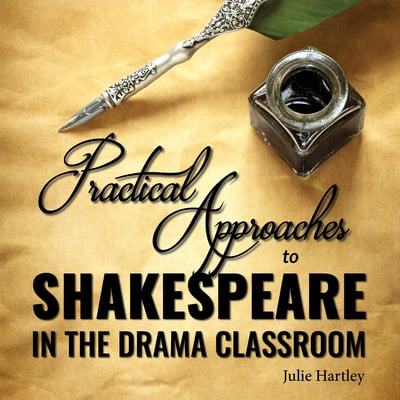There exists in everyone the potential for good or evil. Laramie Dean's adaptation of Dracula asks the question: How much would it take to bring out the darkness inside of you?
Video Tip – Performing Shakespeare
Today we offer a video tip to actors from Lindsay.
How do you prepare to perform Shakespeare?
Transcript
Welcome to our video tip series. This week, let’s talk Shakespeare. Specifically, performing Shakespeare. Now, we here at Theatrefolk are huge advocates for performing, not sitting in a classroom reading (or trying to read) The Bard. And we’ve gone a long way, we’ve got Solo Speare, performing Shakespeare monologues, Scene Speare, Shakespeare scenes, and in those books we try to give as much help as possible for performing those pieces. There’s character questions, vocabulary help, acting hints – but, in the end, the work really does fall to the performer. So here’s our top three Shakespeare performing tips!
Number one: Understand what you’re saying. And if that means writing out all your lines in modern English, do so. It’s really obvious when an actor is parroting words they don’t understand. Number two: Don’t forget the physical side to your character. It’s easy to get lost in the language! Come up with a walk, a physical stance, a gesture – it’ll help your understanding and how you communicate the text. Number three: No British accents. One: It gets in the way. And, you know, Shakespeare wasn’t hoity-toity or high falutin’. In his day, his work was the entertainment of the common man. He was modern. Treat the work as modern, and make the performance come alive.
That’s my tip.
Related Articles
Practical Approaches to Shakespeare in the Drama Classroom
by Julie Hartley
Shakespeare is one of the greatest resources a drama teacher can have. But teaching it can be a challenge. Practical Approaches to Shakespeare in the Drama Classroom helps drama teachers break down the Bard to make his themes, language and characters accessible to all.
Script Bundle - Shakespeare plays
A selection of 10 Shakespeare perusal scripts. Whether it's a cutting that uses the original text, a monologue or scene book, or a parody that spoofs the story, these plays offer a great window into Shakespeare's world.





